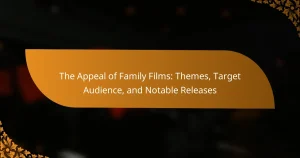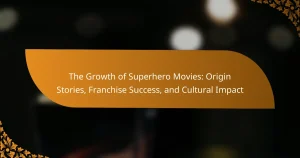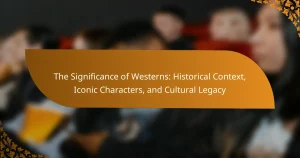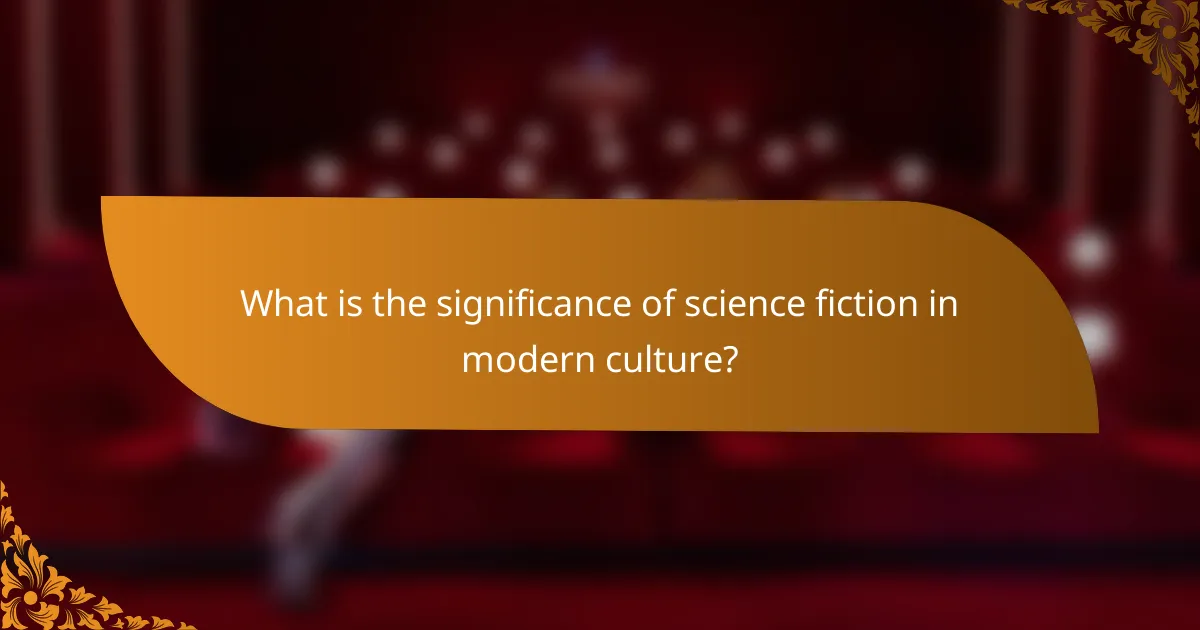
What is the significance of science fiction in modern culture?
Science fiction significantly shapes modern culture by influencing technology and societal perspectives. It inspires innovation by presenting futuristic concepts that often become reality. For instance, concepts like virtual reality and artificial intelligence were popularized through science fiction narratives. These stories encourage critical thinking about ethical implications of technology. They also reflect societal fears and hopes, helping audiences navigate complex issues. Works like “Blade Runner” and “The Matrix” explore themes of identity and reality. Science fiction fosters creativity in various fields, including literature, film, and technology. Overall, it serves as a cultural mirror, reflecting and shaping the zeitgeist.
How has science fiction evolved over the decades?
Science fiction has evolved significantly over the decades. In the early 20th century, it focused on space exploration and technological advancements. Works like H.G. Wells’ “The War of the Worlds” introduced themes of alien encounters. The 1950s and 1960s saw a boom in nuclear themes and dystopian futures, reflecting societal fears. Authors like Isaac Asimov and Philip K. Dick explored complex moral dilemmas and artificial intelligence.
The 1980s and 1990s shifted towards cyberpunk and virtual realities, with films like “Blade Runner” highlighting the impact of technology on humanity. The turn of the millennium brought a focus on climate change and ethical implications of genetic engineering, as seen in “Gattaca.” Recent decades have embraced diverse voices and perspectives, with works addressing social issues and identity.
Today, science fiction continues to reflect contemporary concerns, pushing the boundaries of imagination and technology. It remains a vital genre for exploring the future and human experience.
What historical events influenced the development of science fiction?
The development of science fiction was influenced by several key historical events. The Industrial Revolution in the 18th and 19th centuries introduced rapid technological advancements. These innovations inspired authors like H.G. Wells and Jules Verne to explore futuristic concepts in their works. The World Wars also played a significant role in shaping the genre. The horrors and technological advancements of these conflicts prompted reflections on humanity’s future. The Space Race during the Cold War further fueled interest in space exploration and extraterrestrial life. This period saw the rise of iconic works such as Arthur C. Clarke’s “2001: A Space Odyssey.” Additionally, the advent of nuclear technology raised existential questions, which were explored in various science fiction narratives. Each of these events contributed to the thematic depth and expansion of science fiction as a genre.
How have societal changes shaped science fiction narratives?
Societal changes have significantly shaped science fiction narratives by reflecting contemporary issues and values. For instance, the Cold War era influenced themes of dystopia and nuclear disaster in works like “Fahrenheit 451” by Ray Bradbury. The rise of feminism in the 1960s led to more complex female characters, as seen in “The Left Hand of Darkness” by Ursula K. Le Guin. Environmental concerns in the late 20th century prompted narratives focused on ecological disasters, such as in “The Windup Girl” by Paolo Bacigalupi. Additionally, advancements in technology have inspired stories about artificial intelligence and virtual realities, evident in “Neuromancer” by William Gibson. These narratives often serve as a critique or exploration of societal norms and fears. The evolution of social movements continues to influence the genre, making science fiction a mirror of human experience.
What role do technological innovations play in science fiction?
Technological innovations serve as a fundamental component in science fiction. They shape narratives by introducing futuristic concepts and scenarios. These innovations often reflect contemporary societal concerns and aspirations. For instance, the depiction of artificial intelligence explores ethical dilemmas related to autonomy and control. Additionally, advancements in space travel inspire stories about exploration and colonization of other planets. Films like “Blade Runner” and “The Matrix” illustrate the impact of technology on human identity and society. Furthermore, science fiction often predicts real-world technological advancements, influencing actual scientific research and development. This interplay between fiction and technology fosters imagination and critical thinking about future possibilities.
How do advancements in technology inspire science fiction storytelling?
Advancements in technology significantly inspire science fiction storytelling. They provide new concepts and ideas for writers to explore. For instance, the rise of artificial intelligence has led to narratives about sentient machines. The development of virtual reality has opened avenues for immersive storytelling experiences. Innovations in space exploration fuel stories about interplanetary travel and extraterrestrial life. Historical events, such as the moon landing in 1969, have influenced classic sci-fi works. Current advancements in biotechnology inspire themes of genetic modification and human enhancement. The rapid evolution of communication technologies shapes plots involving surveillance and privacy. Each technological breakthrough offers fresh material for imaginative exploration in science fiction.
What are some key technological themes commonly explored in science fiction?
Key technological themes commonly explored in science fiction include artificial intelligence, space exploration, and virtual reality. Artificial intelligence often examines the implications of sentient machines and ethical dilemmas. Space exploration focuses on interstellar travel and encounters with extraterrestrial life. Virtual reality explores immersive digital environments and their impact on human perception. Other themes include biotechnology, which delves into genetic engineering and human enhancement. Cybernetics often discusses the integration of technology with the human body. These themes reflect societal concerns and aspirations regarding technological advancements.
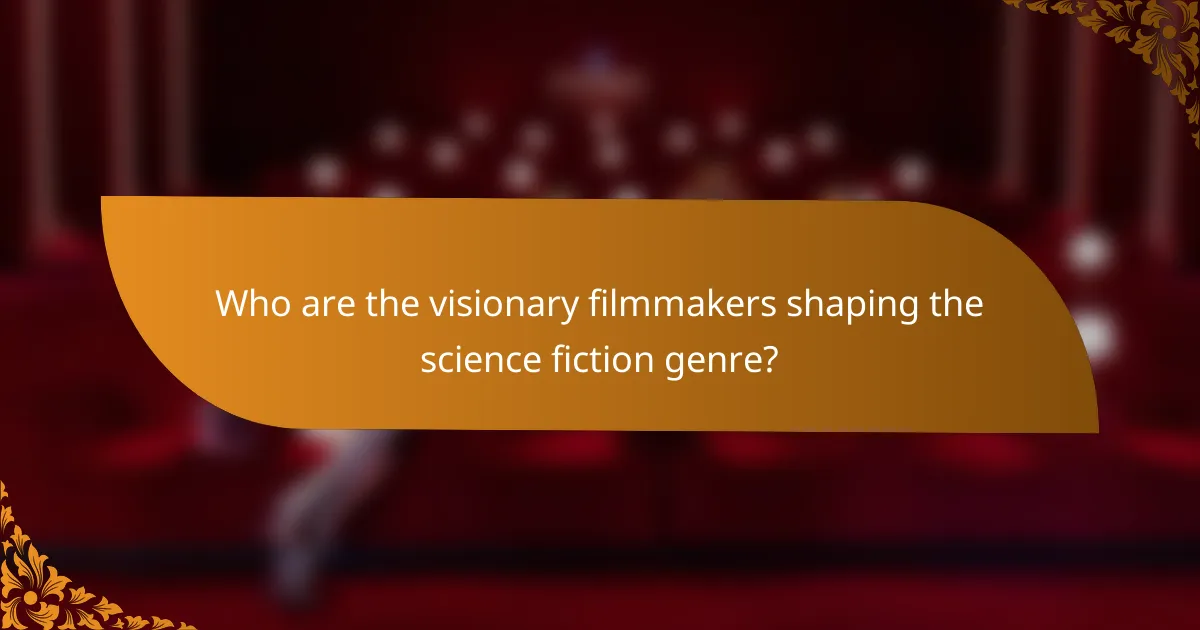
Who are the visionary filmmakers shaping the science fiction genre?
Visionary filmmakers shaping the science fiction genre include Stanley Kubrick, Ridley Scott, and James Cameron. Stanley Kubrick’s film “2001: A Space Odyssey” set new standards for visual effects and narrative complexity. Ridley Scott’s “Blade Runner” explored themes of identity and humanity, influencing countless works. James Cameron’s “Avatar” revolutionized 3D technology and visual storytelling. These filmmakers have significantly impacted the genre through innovative techniques and thought-provoking narratives. Their contributions have inspired future generations of filmmakers and shaped audience expectations.
What contributions have iconic directors made to science fiction?
Iconic directors have significantly shaped the science fiction genre through innovative storytelling and visual techniques. Directors like Stanley Kubrick revolutionized the genre with “2001: A Space Odyssey,” introducing groundbreaking special effects and deep philosophical themes. Ridley Scott’s “Blade Runner” established a visually stunning dystopian world, influencing the aesthetic of future sci-fi films. George Lucas transformed the landscape with “Star Wars,” merging epic storytelling with pioneering special effects technology. James Cameron’s “The Terminator” and “Avatar” pushed the boundaries of CGI and narrative complexity. These contributions have not only defined the genre but also inspired future filmmakers and technological advancements in cinema.
How have their unique styles influenced the genre?
Unique styles of visionary filmmakers have significantly influenced the science fiction genre. Directors like Stanley Kubrick and Ridley Scott introduced groundbreaking visual techniques. Kubrick’s use of symmetry and meticulous detail in “2001: A Space Odyssey” set a new standard for cinematic storytelling. Ridley Scott’s atmospheric world-building in “Blade Runner” established a prototype for dystopian futures.
These filmmakers also explored complex themes like humanity and technology. Their narratives often questioned societal norms and the implications of innovation. This thematic depth encouraged future filmmakers to push boundaries.
The influence is evident in contemporary works that borrow visual and narrative elements from their films. For instance, modern sci-fi often incorporates advanced special effects inspired by Kubrick’s and Scott’s techniques. Their unique styles have thus shaped both the aesthetic and thematic landscape of the genre.
What are some landmark films that defined science fiction?
Some landmark films that defined science fiction include “Metropolis,” “2001: A Space Odyssey,” and “Star Wars.” “Metropolis,” released in 1927, is known for its groundbreaking special effects and dystopian themes. “2001: A Space Odyssey,” released in 1968, is celebrated for its realistic portrayal of space travel and artificial intelligence. “Star Wars,” released in 1977, revolutionized the genre with its epic storytelling and innovative visual effects. Each of these films significantly influenced the development of science fiction cinema. They introduced new concepts, technologies, and narrative styles that shaped future films in the genre.
What emerging filmmakers are redefining science fiction today?
Emerging filmmakers redefining science fiction today include Alex Garland and Nia DaCosta. Alex Garland is known for his films like “Ex Machina” and “Annihilation.” These works explore complex themes of consciousness and identity. Nia DaCosta directed “Candyman” and is set to helm “The Marvels.” Her approach brings fresh perspectives to horror and sci-fi. Additionally, filmmakers like Jordan Peele and Julia Ducournau are making significant contributions. Jordan Peele’s “Get Out” and “Us” blend horror and social commentary. Julia Ducournau’s “Titane” challenges genre conventions with unique storytelling. These filmmakers are pushing boundaries and expanding the narrative possibilities of science fiction.
How are new voices bringing fresh perspectives to the genre?
New voices are bringing fresh perspectives to the science fiction genre by introducing diverse narratives and innovative storytelling techniques. These creators often draw from their unique cultural backgrounds, enriching the genre with varied experiences. For instance, filmmakers like Nia DaCosta and Jordan Peele have incorporated social commentary into their works, challenging traditional sci-fi tropes. Their films explore themes of identity, race, and societal issues, which resonate with a broader audience. Additionally, emerging writers are experimenting with non-linear narratives and blending genres, creating fresh and engaging content. This shift reflects a growing trend towards inclusivity and representation within science fiction. Recent works, such as “The Broken Earth” trilogy by N.K. Jemisin, have won prestigious awards, highlighting the impact of these new voices.
What innovative techniques are they using in their storytelling?
Innovative techniques in storytelling include immersive world-building and nonlinear narratives. Filmmakers utilize virtual reality to create engaging experiences. This allows audiences to explore environments interactively. Nonlinear narratives challenge traditional storytelling structures. They encourage viewers to piece together the story from various perspectives. Additionally, filmmakers integrate augmented reality elements into their narratives. This enhances viewer engagement by blending the real and fictional worlds. Enhanced visual effects also play a crucial role. They create realistic depictions of futuristic technologies and environments. These techniques collectively redefine audience interaction and emotional connection with the story.
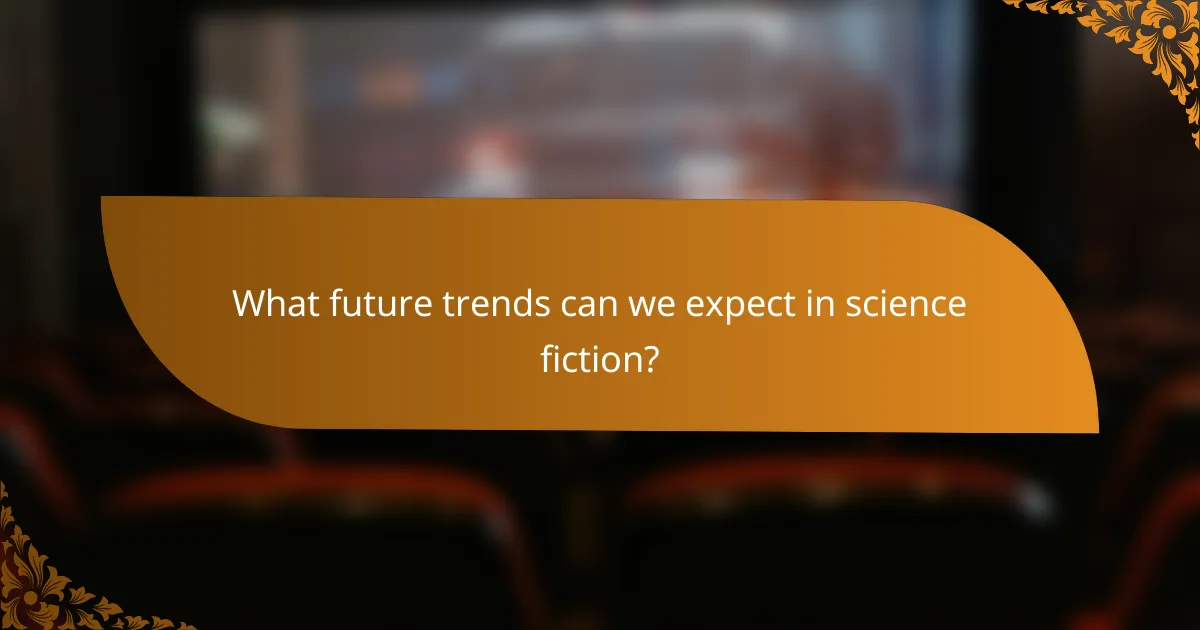
What future trends can we expect in science fiction?
Future trends in science fiction include an increased focus on climate change narratives. These stories will explore dystopian futures shaped by environmental collapse. Another trend is the integration of artificial intelligence as central characters. AI will be portrayed in complex roles, challenging human identity and ethics. Virtual reality and immersive storytelling will also gain prominence. Audiences will experience narratives in interactive formats. Additionally, diverse representation will expand, highlighting underrepresented voices. This shift reflects a broader cultural awareness. Lastly, science fiction will increasingly intersect with real scientific advancements. Concepts like space exploration and biotechnology will influence plotlines.
How is the genre adapting to current global issues?
The genre of science fiction is adapting to current global issues by incorporating themes of climate change, social justice, and technological ethics. Recent films and literature reflect societal anxieties about environmental degradation. For example, “The Wandering Earth” explores planetary survival amidst climate crisis. Additionally, narratives address inequality and systemic oppression, as seen in works like “The Hunger Games.” The rise of artificial intelligence in storytelling raises ethical questions about technology’s impact on humanity. This shift mirrors real-world concerns about privacy and surveillance. By engaging with these topics, science fiction remains relevant and thought-provoking in today’s context.
What themes are becoming more prevalent in contemporary science fiction?
Contemporary science fiction increasingly explores themes of climate change, artificial intelligence, and social justice. Climate change narratives often depict dystopian futures shaped by environmental collapse. These stories reflect real-world concerns about global warming and ecological destruction. Artificial intelligence themes focus on the ethical implications of advanced technologies. Works in this area question the relationship between humans and machines. Social justice themes address issues of inequality, race, and identity. They often envision futures that challenge systemic oppression. These themes resonate with current societal debates and reflect a growing awareness of interconnected global issues.
How might science fiction influence future technological advancements?
Science fiction can significantly influence future technological advancements by inspiring innovation and shaping public perception. Many technologies we use today were first imagined in science fiction. For example, the concept of the mobile phone was popularized by the communicator in “Star Trek.” This vision led to the development of real mobile communication devices.
Additionally, science fiction often explores the implications of technology on society. Works like “1984” and “Brave New World” provoke discussions about surveillance and ethics. These narratives can guide policymakers and technologists in making informed decisions.
Moreover, science fiction stimulates creativity in engineers and scientists. It encourages them to think beyond current limitations. This imaginative leap can lead to breakthroughs in fields like artificial intelligence and space exploration.
Overall, science fiction serves as both a source of inspiration and a cautionary tale, influencing the trajectory of future technological advancements.
What can audiences do to engage with the science fiction genre more deeply?
Audiences can engage with the science fiction genre more deeply by exploring diverse media forms. This includes reading science fiction literature, watching films, and playing video games. Engaging in discussions about themes and concepts enhances understanding. Attending science fiction conventions fosters community and shared experiences. Participating in online forums allows for deeper analysis of narratives. Following creators and influencers in the genre provides insights into their creative processes. Additionally, engaging with educational content related to science fiction can broaden perspectives. These actions collectively deepen appreciation and understanding of the genre’s complexities.
How can viewers explore the themes and messages in science fiction films?
Viewers can explore themes and messages in science fiction films by analyzing plot elements, character development, and visual storytelling. Understanding the socio-political context during production enhances interpretation. Engaging with film critiques and scholarly articles provides deeper insights. Discussions in film forums and communities can reveal diverse perspectives. Rewatching films with a focus on specific themes can uncover nuances. Notable examples include “Blade Runner” and its commentary on humanity. Analyzing dialogues and symbols within the narrative also aids comprehension.
What are some recommended practices for appreciating science fiction storytelling?
To appreciate science fiction storytelling, engage with the themes and concepts presented. Analyze how the narrative reflects societal issues or technological advancements. Consider the world-building elements that create immersive settings. Reflect on character development and their journeys within the plot. Explore the use of speculative elements to challenge reality. Discuss the implications of the story’s technology on human experience. Read critically, comparing different works and their approaches to similar themes. Join discussions or forums to share insights and interpretations with others.
The main entity of the article is science fiction, which plays a crucial role in modern culture by influencing technology, societal perspectives, and creative expression. The article explores the evolution of science fiction over the decades, highlighting its historical influences, key technological themes, and the impact of visionary filmmakers on the genre. It also discusses emerging voices in science fiction, future trends, and how the genre adapts to current global issues. Additionally, the article provides insights into how audiences can engage more deeply with science fiction narratives and appreciate their thematic complexities.
